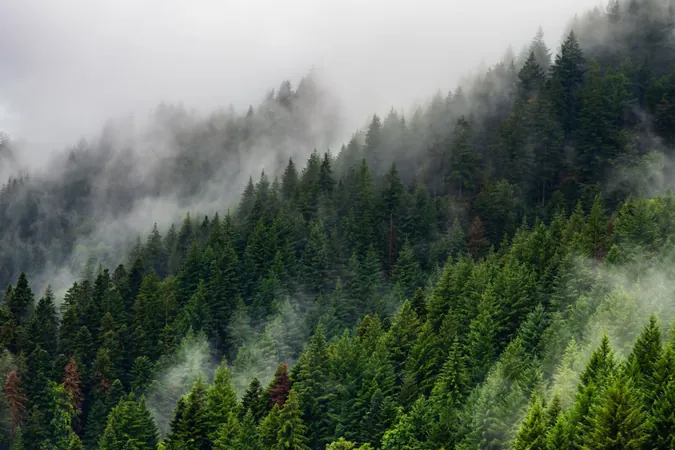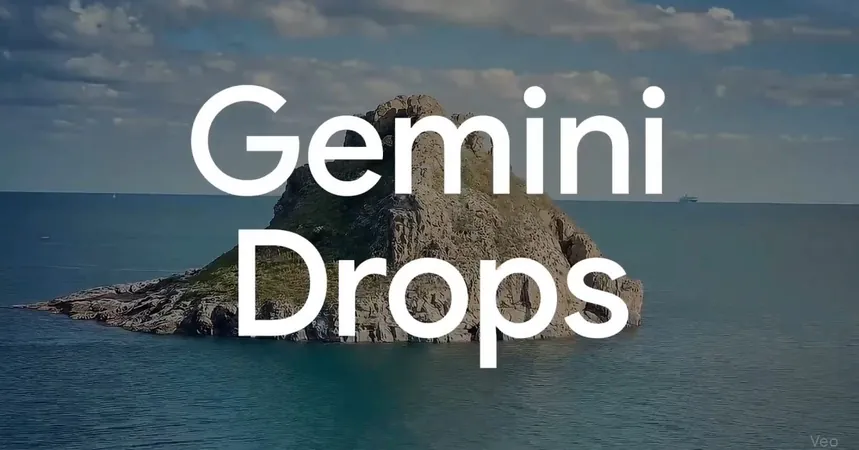
Alarm Bells Ring: Trees and Oceans Are Losing Their Ability to Absorb Carbon – Here's What That Means for Our Planet
2024-11-11
Author: Amelia
In a groundbreaking revelation that raises serious concerns about our planet's health, researchers have discovered that trees, once vital guardians of our environment, are struggling to absorb carbon dioxide amid an escalating climate crisis. A single mature tree historically absorbed over 48 pounds of carbon dioxide annually while providing essential oxygen. However, 2023, the hottest year to date, has brought shocking findings that suggest trees and soil are absorbing virtually no carbon.
What’s Going On?
As reported by the Guardian, wildfires, droughts, and other climate-induced disasters have severely compromised the ecosystem's ability to function effectively. The stark reality is that our natural systems are being pushed beyond their limits, resulting in deteriorating public health and decreasing air quality.
Notably, the oceans—once the ultimate carbon sinks—are also showing signs of distress. Previously absorbing up to 90% of the excess heat produced by human activities, our oceans are now becoming less capable of serving as buffers against climate change. For instance, the delicate balance of zooplankton, which plays a critical role in collecting carbon from the underwater surface, is thrown off by melting sea ice, which allows more sunlight to penetrate.
Philippe Ciais, a prominent climate researcher, highlighted a worrying trend: “In the Northern Hemisphere, where over half of CO2 uptake occurs, we have observed a concerning decline in carbon absorption for the past eight years, and there's no clear indication that this will improve.”
Why Is Carbon Absorption Crucial?
The decline in natural carbon absorption is alarming as it threatens one of Earth’s essential mechanisms for regulating climate. Historically, humanity has depended on forests, land, and oceans to act as carbon sinks, offsetting the enormous pollution we inject into our atmosphere. With these natural systems faltering and extreme weather becoming increasingly commonplace, our planet’s future hangs in precarious uncertainty.
Johan Rockström, director of the Potsdam Institute for Climate Impact Research, emphasizes the gravity of the situation: “We’re witnessing cracks in the resilience of the Earth's systems. Terrestrial ecosystems are losing their capacity for carbon storage, and similar signs of stress are emerging in the oceans. Up until now, nature has balanced our excesses, but that era is rapidly closing.”
The Road Ahead: Can We Save Our Planet?
While previous studies suggested that the decline in natural carbon sinks would manifest over a century or more, current findings indicate that the situation may worsen far sooner. Alarmingly, the only tropical rainforest currently absorbing more carbon dioxide than it releases is the Congo Basin, raising urgent questions about the sustainability of other forested regions.
Addressing the decline in carbon absorption requires a concerted effort and a transformative shift in how we live. While it is challenging to predict exactly how carbon sinks will evolve, researchers are focused on bridging the knowledge gaps regarding carbon flows across different ecosystems.
The imperative is clear: As natural systems falter, it falls on us to dramatically reduce carbon emissions and reestablish environmental balance. Simple lifestyle changes—such as opting for electric vehicles, embracing low-impact travel, upcycling clothing, adopting plant-based diets, and upgrading ineffective appliances—can contribute significantly if embraced collectively.
Don’t Wait—Act Now!
With the world at a tipping point, the time for action has never been more critical. Awareness and adaptation are vital in the fight against climate change. Humanity's relationship with nature must evolve, for the stakes have never been higher. Our planet’s future is in our hands—let’s make sure we reshape that future for the better.









 Brasil (PT)
Brasil (PT)
 Canada (EN)
Canada (EN)
 Chile (ES)
Chile (ES)
 Česko (CS)
Česko (CS)
 대한민국 (KO)
대한민국 (KO)
 España (ES)
España (ES)
 France (FR)
France (FR)
 Hong Kong (EN)
Hong Kong (EN)
 Italia (IT)
Italia (IT)
 日本 (JA)
日本 (JA)
 Magyarország (HU)
Magyarország (HU)
 Norge (NO)
Norge (NO)
 Polska (PL)
Polska (PL)
 Schweiz (DE)
Schweiz (DE)
 Singapore (EN)
Singapore (EN)
 Sverige (SV)
Sverige (SV)
 Suomi (FI)
Suomi (FI)
 Türkiye (TR)
Türkiye (TR)
 الإمارات العربية المتحدة (AR)
الإمارات العربية المتحدة (AR)